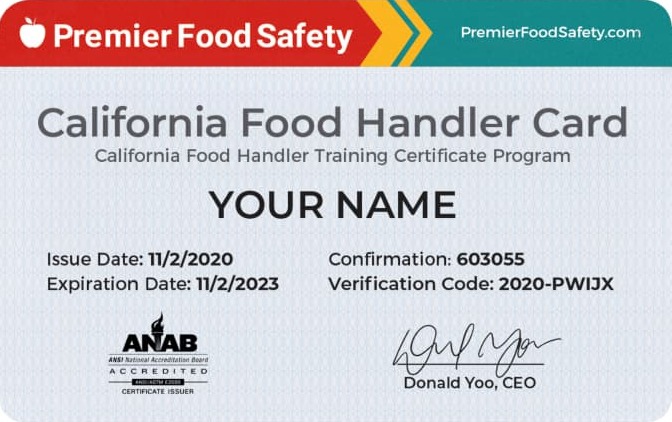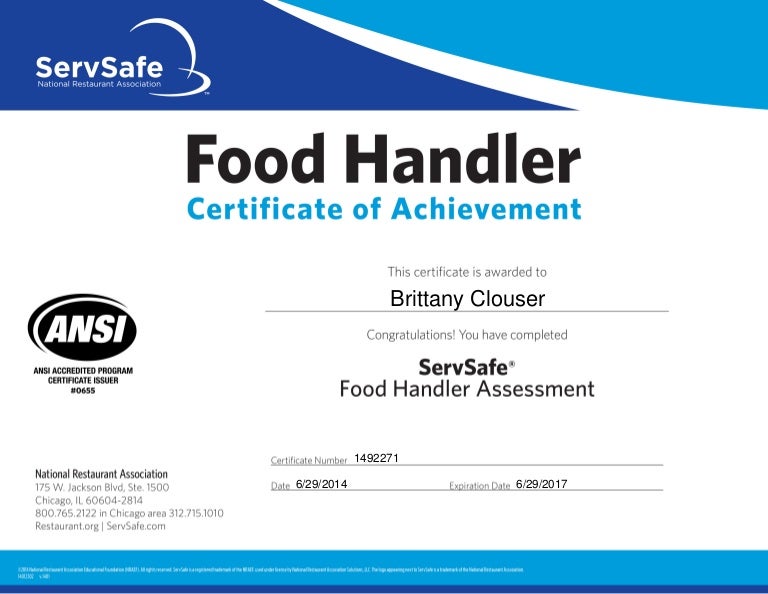How ServSafe Food Handlers Certificates Aid Avoid Foodborne Illnesses
How ServSafe Food Handlers Certificates Aid Avoid Foodborne Illnesses
Blog Article
Get Licensed: Master Food Safety And Security With Food Handler Qualification
The significance of obtaining a Food Trainer Qualification can not be overemphasized in today's food solution landscape. As the sector encounters raising examination relating to food safety standards, understanding the certification procedure and its effects comes to be vital.

Importance of Food Safety And Security Qualification
Food security certification is vital for making certain that food trainers are geared up with the expertise and abilities necessary to keep high requirements of hygiene and safety and security in food prep work and service. This qualification not only boosts the expertise of individuals operating in the food market but additionally fosters a society of security that profits both workers and customers.
By getting food security certification, food handlers end up being familiar with necessary methods such as correct food storage space, cross-contamination avoidance, and individual health standards. ServSafe Food Handler. This understanding significantly lowers the danger of foodborne health problems, which can have severe health implications and impact public rely on food establishments. Moreover, licensed food trainers are much better prepared to follow regional and national laws, consequently decreasing the risk of lawful liabilities and charges for food companies.
In addition, having actually accredited team can boost a facility's track record, as consumers increasingly focus on security in their eating experiences. Ultimately, food safety and security qualification is not just a regulative requirement; it is a vital financial investment in the overall high quality and dependability of food service operations, fostering trust and making certain that security remains a top priority in the industry.

Overview of Certification Process
Securing food safety certification entails an organized process made to outfit food trainers with the essential expertise and skills. This procedure normally starts with selecting a certified training program, which can be supplied in various styles such as in-person courses, on the internet courses, or hybrid choices. Individuals should select a program that fulfills regional regulatory needs and aligns with their understanding preferences.
As soon as enrolled, candidates take part in extensive training that covers crucial food security principles and practices - ServSafe Food Handler. This training frequently consists of interactive components, real-world scenarios, and evaluations to enhance learning. After finishing the coursework, individuals need to pass a certification test that examines their understanding of food safety principles
Upon successfully clearing the exam, individuals get their food trainer qualification, which is normally valid for a certain duration, commonly varying from one to three years. It is crucial for certified food handlers to remain updated with any changes in food safety policies and techniques, demanding regular renewal or proceeding education and learning. This accreditation procedure is essential for ensuring that food trainers are experienced about safe food managing methods, thus reducing the risk of foodborne ailments and promoting public wellness.
Trick Subjects Covered in Training
A thorough food handler training program typically covers numerous essential topics crucial for keeping food safety and protecting against foodborne illnesses. Recognizing the principles of food security is fundamental, consisting of the value of appropriate health techniques for food trainers. This consists of handwashing methods, appropriate use gloves, and individual cleanliness criteria.
An additional important location is the recognition and management of food hazards. Students find out about organic, chemical, and physical risks, together with strategies for protecting against cross-contamination. Temperature level control is additionally stressed, as keeping appropriate cooking and storage temperatures is important for inhibiting bacterial growth.
The training program addresses secure food storage space methods, describing exactly how to appropriately classify and organize food items to ensure quality and safety. Additionally, participants are enlightened on cleansing and sterilizing treatments for equipment and surfaces to remove potential pollutants.

Benefits of Obtaining Licensed
Obtaining food trainer qualification uses countless benefits that expand beyond individual expertise and abilities. It enhances an individual's understanding of safe food techniques, which is critical in stopping foodborne health problems. This expertise not only safeguards the health and wellness of customers however additionally advertises a culture of food security within the work environment.
In addition, certification shows a commitment to professionalism and reliability and obligation. Employers often favor or call for licensed employees, acknowledging that qualified individuals are a lot more most likely to comply with security procedures and regulations. This can result in boosted work environment efficiency and minimized obligation for organizations, as qualified team are better furnished to handle food safely.
Additionally, getting accreditation can increase a person's self-confidence in their function within the food service industry. This self-confidence can translate right into better customer care and satisfaction, as employees that recognize food safety and security are more probable to connect effectively concerning cooking and handling.
Finally, many certification programs provide updated training and sources, ensuring that qualified people stay notified about the most current regulations and best methods, thereby enhancing their duty as educated experts in the food safety and security landscape.
Occupation Opportunities in Food Security
The structure of food safety knowledge gained through qualification opens up a range of profession possibilities within the food industry. As food safety continue reading this and security guidelines end up being progressively stringent, services seek qualified professionals to guarantee compliance and maintain high requirements.
Individuals with food handler accreditation can pursue duties such as food safety and security examiners, that analyze centers for adherence to health guidelines, or food security supervisors, tasked with creating and carrying out safety and security methods in food handling plants or dining establishments. Additionally, functions in quality control and control are offered, where experts keep an eye on production procedures to mitigate dangers connected with foodborne illnesses.
Furthermore, the expanding pattern of food sustainability and natural products has created chances for food safety and security experts that concentrate on encouraging firms on finest visit site techniques. Those with a certification can also discover placements in education and learning and training, assisting to enlighten others concerning safe food handling techniques.

Verdict
Food handler accreditation offers as an important element in boosting food security within the food solution market. As food security continues to be a top priority, the accreditation opens doors to countless career opportunities in this necessary field.
By getting food safety qualification, food trainers come to be acquainted with important practices such as appropriate food storage space, cross-contamination useful site avoidance, and personal health standards.Securing food safety and security accreditation involves a structured process developed to equip food trainers with the essential knowledge and skills. It is important for licensed food trainers to stay upgraded with any kind of adjustments in food security guidelines and practices, necessitating periodic revival or continuing education and learning.An extensive food trainer training program generally covers several crucial topics important for keeping food safety and stopping foodborne ailments.Food handler accreditation offers as a crucial part in improving food safety and security within the food service market.
Report this page